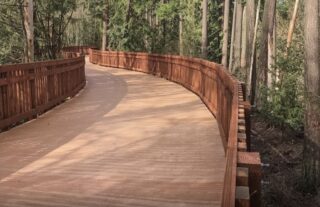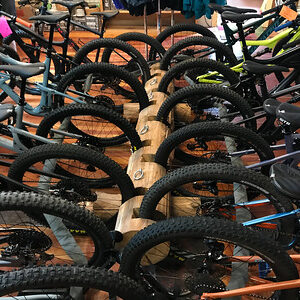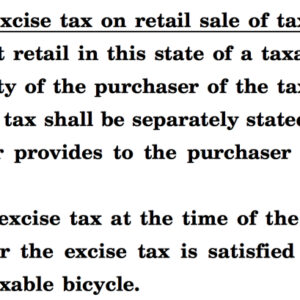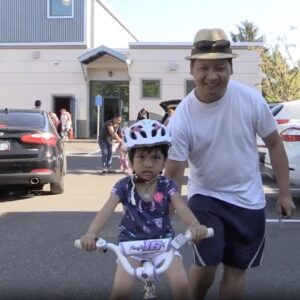
(Photo: City of Tualatin)
Here’s what the State of Oregon is doing with that tax you pay on the purchase of new bicycles: The Oregon Department of Transportation has just launched a new program that could provide an estimated $14 million to multi-use path projects statewide.
The Oregon Community Paths program is the evolution of the active transportation portion of the state’s Connect Oregon (Lottery-backed) program. When the legislature passed a transportation funding bill in 2017 (HB 2017) they shifted the 7% of Connect Oregon that went to bicycling and walking projects into a separate program named the Multimodal Active Transportation Fund. That fund now also includes revenue from the bicycle excise tax that went into effect in fall 2017 and the federal Transportation Alternatives program.
According to ODOT Tourism and Scenic Byway Program Manager Sandra Hikari the Community Path Fund will start awarding grants in 2021. The $14 million estimate is for a three-year grant cycle ending in 2024. Asked for examples of projects that will compete well for the funds, she pointed to the Bear Creek Greenway in southern Oregon and the Tualatin River Greenway in Washington County.
Advertisement
ODOT limits the type of projects that can be paid for with these funds. According to the program website, the grants can pay for:
-Development, construction, reconstruction, major resurfacing, or other capital improvements of multiuse paths, bicycle paths and footpaths.
-Planning, design and engineering expenses, including consultant services, associated with developing eligible infrastructure projects.
– Federal regulations also limit who may apply for TA funds. Those who can include: A local government, including city, town, township, village, borough, parish, tribal government or county agencies. Transit agencies, any federal, tribal, state or local agency responsible for Natural Resources or public land administration (e.g. park, forest, fish/game/wildlife agencies, Department of Interior, U.S. Forest Service). A non-profit organization entity responsible for administration of local transportation safety programs. Management of TA projects must be a certified agency. While ODOT is ineligible to apply for TA funds, non-certified agencies may partner with ODOT to manage the project.
Rules and selection criteria for the program are still being worked out with the Oregon Bicycle and Pedestrian Advisory Committee who are set to discuss the issue at their next meeting on February 11th and 12th in Astoria.
Learn more on ODOT’s website.
— Jonathan Maus: (503) 706-8804, @jonathan_maus on Twitter and jonathan@bikeportland.org
— Get our headlines delivered to your inbox.
— Support this independent community media outlet with a one-time contribution or monthly subscription.







Thanks for reading.
BikePortland has served this community with independent community journalism since 2005. We rely on subscriptions from readers like you to survive. Your financial support is vital in keeping this valuable resource alive and well.
Please subscribe today to strengthen and expand our work.
Would love to see the Salmonberry Trail implemented more quickly and connect past Wy’east/Mt Hood to create a complete, regional trail system from the bay to the mountain.
https://www.salmonberrytrail.org/
I’d love to see this tax eliminated, and in it’s place, I’d like to see an increase in gas tax/ parking fees/ higher environmental standards for emissions for autos, increased cost for tags for larger SUVs, immediate tolls at the bridge and the tunnel, increased mileage of HOV lanes, free access to transit, expansion of transit, and the immediate build out of the 2030 Bicycle Master Plan.
But all I’ve got is this regressive bike tax.
Hey look at it this way at least with the bike tax you have “skin in the game”.
More like road rash…
Bike tax implemented (most of it goes to administrative costs) and the next thing we know PDX sees a substantial decline in the percentage of people riding bikes to work.
It’s almost as if when you tax something you discourage it (bike use) but when you heavily subsidize something you get more of it (car use).
I’m not certain that “bike tax implemented” —> “substantial decline in the percentage of people riding bikes to work”. Unless there is a hidden tax somewhere, it’s $35 tacked onto to the purchase of a new bike. I agree with you that this bike tax is targeting the wrong thing and encouraging bad policy, but I’d caution with this reasoning because we need to pick and choose our battles here.
To help with cycling numbers, I’d love to see a subsidy for electric bikes (the same way we have for electric cars), and more investment in clean, safe off-street bike paths, and the expansion of bike parking on the street (those bike corralls).
You’ve got both!
I’ve heard (from ODOT) they are not getting the revue they anticipated and they are blaming it on non-compliance. I reckon there is more to it than that though I’d love to see all the bike shops stop complying en masse.
This program should be called lipstick, as in on a pig. It’s just a dressing up of our laughably low funding for any mode of transportation that doesn’t involve one person in an oversized motor vehicle.
Now we’re all going to get distracted by the notion that it’s better than nothing, although to the extent this causes people to lose some of the fire in their bellies to fight to not only end car subsidies but to reclaim past subsidies and redirect them to a zero-emission future it will be worse than nothing.
Last Connect Oregon round of funding spent $7.8 million on bike infrastructure in a 2 year period. So that’s $3.9 million annually. This will spend $14 million in 3 year period so $4.7 million annually or about $800 thousand annual increase over the previous program. That’s what the bike tax bought us? I can’t imagine this additional spending offsetting the damage that a $15 per bike tax causes to demote bicycling at the very first point of entry into the activity.
End the bicycle tax even if it means losing the additional funding for infrastructure spending!
Finally, the State of Oregon cut me a $2,500 check for buying an electric car. I’m here to thank 167 new bicycle buyers.
It’s beyond ridiculous that you get paid to buy a car but have to pay extra to buy a bike! And for what? Some extra development the state should be undertaking anyway?
Even more important, some extra development that’s not on a state highway or locally managed road.
/irony
Wait.. this makes sense. How did that happen?
14 million for bike paths? Or 14 million for the homeless? Priorities bikes or people? Not so hard to figure out, well done Oregon.
C, G, or A. Nobody rides for free. If you choose to avoid work and shit on the sidewalk you need help. If I could afford that assistance I would move to a place where I could ride my mountain bike without driving. I didn’t put the needle in your arm. I didn’t get the high from it. I am not paying for it. If you truly care about “IT” do something. Don’t expect everyone else to jump in. Life is hard.
This tax is about as important as the “arts” tax. What a joke! There was a vibrant music scene in this town. Where did that go?
And it looks like they are going to shove through another cash grab on the May ballot. All to keep fueling the homeless industrial complex.
I don’t understand the “bikes should pay for their own infrastructure” argument, at all. Start with pristine land and put a path across it. In the earliest days, the path was dominated by walkers, then by people on horses, and then by horses, mules, and oxen pulling carts. Eventually the bicycle came along. It wasn’t until the early part of the last century that the “Good Roads” movement pushed for infrastructure that could accommodate motor vehicles. But that didn’t mean pushing everyone else out. Bike lanes, sidewalks, and side paths have had to be added to roads only b/c motor-vehicle operators don’t want to share the roads. So it’s completely justified that motor-vehicle owners pay for the infrastructure that speeds their journeys.
Well they should…but they pretty much already do. Or rather, less subsidized than cars because no roads are paid for completely through transportation related taxes and fees.
A vast majority of drivers believe that the gas tax not only pays for every type of road but also pays for them fully. That’s why you get the “I pay my fair share” arguments from drivers, with the assumption cyclists do not contribute anything.
In many cases, it is cheaper to add to existing infrastructure than to build new. Hence, the coupling of bike lanes and roads.
Well, we need a full-court press to change this view, esp when you get sources like WW splashing a headline like this one:
Since Bicycles Share the Roads With Automobiles, When Will They Be Required to Also Share the Costs?
(https://www.wweek.com/news/2020/01/29/since-bicycles-share-the-roads-with-automobiles-when-will-they-be-required-to-also-share-the-costs/)
If a person walks down the road, is that person paying the cost? Yes.
The roads in the 1890’s were rough and muddy in the winter and rutted and dusty in the summer. Local bike groups were pushing for bike trails to be built so they would have something smooth to ride on. It sounds like volunteers built many of the trails.
Both Portland and Vancouver had $1 annual bike license for several years. That’s $30 in today’s money and it was an annual fee. If you road in both Portland and Vancouver you would need a license for each city and risked being fined if you didn’t have one. I don’t know how Portland used their money but Vancouver/Clark County spent money on improving routes to make them rideable.
The bike license in Vancouver only lasted a few years. It ended up being challenged in court and stopped. They didn’t have the authority at the time to either require a license or charge the fee. Don’t remember which one.
actually, the first paved roads in this country were for cyclists, and the ‘good roads’ movement was led by cyclists; the motorists merely took advantage of it after the fact.
I’ve only ridden the Bear Creek train from Medford to Ashland once, and it was three years ago, but all power to them if they can get some money to fix that trail. The asphalt was riddled with roots — it was more motocross whoops than bikeway. I pity anyone trying to ride it on a skateboard or in roller skates.
Can anyone tell me how this bike tax helps Rural Oregonians? What new bike paths are you creating East of Bend? This is another case where the Urbanites force a tax on the entire state to increase their quality of life with no thought to how it affects the rest of the state. These taxes should be done at the county or city level so the groups they help are the ones paying for that cost.